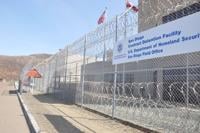On a typical day, Delvi Henriquez, 62, takes a total of three buses to get to her job. Henriquez cleans houses, but because of her physical disability, she is only able to work three hours each day. “I only make about $30 per day,” Henriquez told CALÓ NEWS. “I live day-by-day.”
To save money, Henriquez walks a portion of her commute. “I get off the bus on [the intersection of] Jefferson Boulevard and Sepulveda Boulevard, and from there, I walk to Santa Monica Boulevard and Sepulveda Boulevard,” she said. That is a total of five miles, which takes approximately 1.5 hours walking. But since Henriquez has an injured foot, it tends to take her longer.
“Many of the people who you see on the bus are people like me. We are older people,” Henriquez said. “Because of my age and condition I do not work like I used to and I get no benefits from the government or no benefits whatsoever. This is the reality that many of us are living in.”

Delvi Henriquez. (Photo by Brenda Fernanda Verano.)
On Thursday, Dec. 1, Henriquez and other community leaders and organizations such as Strategic Actions for a Just Economy (SAJE), Alliance for Community Transit-LA (ACT-LA) and Community Power Collective (CPC) gathered outside of the Los Angeles County Metropolitan Transportation Authority (LA Metro) headquarters, to demand universal fareless transit in LA. The demonstration started at 9 a.m., an hour before the Metro Board of Directors meeting.
The demonstration filled the front of the LA Metro Building, where attendees carried signs that read “Better buses, no fares,” “Fareless transit now” and “Abolish fares.”
Since the LA Metro public hearing on Nov. 14, where more than 70 unhappy public transit riders and community organizers testified against the fare hike proposal, the agency has updated their initial proposal. “We take the public comment process seriously and have modified the fare restructuring as part of the formal recommendation,” LA Metro stated on their website.
Their proposed changes were presented and approved in the Metro Board of Directors meeting which also took place last Thursday. Changes include: eliminating fare hikes for seniors and disabled people, as well as no longer tying fare increases to inflation. In addition, the board also voted in favor of lowering the seven-day and daily fare cap from $6 to $5. Another change from their initial proposal is the elimination of charging extra fare for the J (Silver) Line and express buses. Fares for the J Line and express buses will now be the same as for all Metro buses and trains.
CPC, who has been on the forefront of the fareless transit initiative, celebrated the new and improved changes made to the initial proposal, but said the fight continues. “Major win for the community today. But we are not done fighting, we still have to win a universal fareless transit for everyone in our communities,” CPC wrote in an Instagram post.
The fareless transit initiative, which has always been the end goal for organizations like CPC, SAJE and ACT-LA, also made it to the agenda of the December 1st, LA Metro Board meeting. At the meeting, ACT-LA shared an open letter addressed to the board of directors, which demanded LA Metro to consider a path towards universal fareless transit. “This should include, as first steps, reinstating a fareless transit task force, this time with community representation, to understand the transportation cost burden of its riders and the full cost of its fare system. This task force should produce an action plan that outlines how universal fareless transit can happen in LA,” stated the open letter.

(Photo by Brenda Fernanda Verano.)
The board has not completely shut off the idea of free transportation and instead ordered for a report back on the fareless transit initiative. More details of the report back are expected to follow in the upcoming months.
In their open letter, ACT-LA also included the list of signatures gathered via their online petition which stated that “many LA transit riders want universal fareless transit, divestment from law enforcement, and investment in care-based safety strategies.“ A total of 634 people across LA County signed the petition.
Oscar Zarate, director of Building Equity and Transit at SAJE, said fareless transit is something obtainable and feasible. “The next steps are pretty clear,” Zarate told CALÓ NEWS. Besides relying on the LA Metro Board to create a task force that would abolish fares, he believes it is also important to rely and hold elected officials accountable. “Another step would be for Karen Bass to uphold the promise she made during her campaign to let people that reflect the values and needs of working-class transit riders to sit on the Metro board.”
Despite the revised and updated proposal, there are still implementations and realities that alarm community organizers. One of them is LA Metro’s investment in police and the ongoing Metro’s law enforcement contracts. Last year, the Metro Board of Directors approved $75 million for the contracts paying for officers from the LAPD, the Long Beach Police Department and the LA County Sheriff’s Department.
This is something Scarlett De Leon, campaigns director with ACT-LA, wanted to uplift in last Thursday’s demonstration. “Metro is still spending a ridiculous amount [of money] on policing,” de Leon told attendees. “What we are asking for is very simple: for the spending of our public agencies to reflect the needs of those who use them, of the public and riders. That means public safety and fareles transit, not police.”

(Photo by Brenda Fernanda Verano.)
Another implementation from LA Metro’s initial proposal that has not changed is the requirement for riders to have a LA Metro TAP card in order to access fare-capping benefits.
Carmina Calderon, senior organizer at CPC, said this is pushing people to change how they access public transportation. “We know there’s older folks that do have a TAP card, but there’s a lot of others that we have spoken with, especially in Boyle Heights and East LA that still use cash,” Calderon told CALÓ NEWS. “It’s going to be hard for them to change their habits and to transfer right over to TAP. Cash should always be an option and people should not be penalized for using that option.”
The Latino community continues to be the largest ethnic group utilizing the transit system, representing 58% of LA Metro riders, according to LA Metro’s 2022 Customer Experience Survey.
Henriquez, who lives in South LA, said that although she has grown tired of her daily commute, it is something she will continue to do in order to make ends meet. “I ask the Latino community to join us in the fight for a free transportation system, because, as elders, we are tired of not being heard and taken into consideration,” Henriquez told CALÓ NEWS. “We are in a living crisis, an economic recession and still in an ongoing pandemic. We need free transportation in our community today.”
To read the finalized and updated fare hike proposal you can visit the LA Metro news website HERE.


















(0) comments
Welcome to the discussion.
Log In
Keep it Clean. Please avoid obscene, vulgar, lewd, racist or sexually-oriented language.
PLEASE TURN OFF YOUR CAPS LOCK.
Don't Threaten. Threats of harming another person will not be tolerated.
Be Truthful. Don't knowingly lie about anyone or anything.
Be Nice. No racism, sexism or any sort of -ism that is degrading to another person.
Be Proactive. Use the 'Report' link on each comment to let us know of abusive posts.
Share with Us. We'd love to hear eyewitness accounts, the history behind an article.